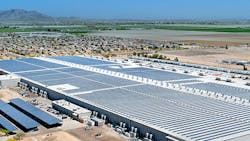Elon Musk might have more work to do to convince his own shareholders to go along with the $2.6 billion proposed merger of Tesla Motors Inc. and SolarCity Corp.
Shares in both companies slumped after Musk — the largest individual shareholder in SolarCity — announced that Tesla had agreed to pay about $300 million less than initially proposed six weeks ago to acquire the rooftop solar installer. The revised terms come after criticism from Tesla investors and on the same day SolarCity lowered its forecast for 2016.
Musk, Tesla’s chairman, has said the combined company would become a clean-energy giant. He will have a couple of months to convince SolarCity shareholders to take the lower offer and will have to reassure Tesla investors that the company can afford to carry SolarCity while also coming up with billions of dollars to fund a slew of new vehicles.
“I’m not sure it’s a great deal for Tesla shareholders,” said Maryann Keller, a former Wall Street analyst who is now an auto industry consultant in Stamford, Connecticut. “Musk can probably sell it based on his cult of personality. The true believers will buy into it.”
Installation rates for SolarCity’s rooftop panels are slowing, and the San Mateo, California, company lowered its forecast Monday for at least the second time this year. In a separate statement Monday, SolarCity said installations this year will be 900 megawatts to one gigawatt, down from a May estimate of at least 1 gigawatt.
SolarCity became the biggest U.S. rooftop solar company largely by focusing on growth at the expense of profit, and investing revenue into building more systems. That expansion has been slowing in recent months as regulators imposed barriers to the solar leases that make up most of its business and it made strategic shifts aimed at boosting cash flow.
That’s boosted debt to $3.25 billion, and it has reported losses in all but three quarters since its 2012 initial public offering. It announced in October plans to slow growth and focus on becoming profitable.
Under the new agreement, SolarCity investors will receive $25.37 a share in Tesla stock, compared with the initial offer of $26.50 to $28.50 when the deal was announced in June, Tesla said in a statement Monday.
Combining the companies will create market opportunities for both, Musk said. “The point of the merger is to remove conflicts of interest,” he said on a conference call Monday.
The deal will now go to the shareholders of the companies for approval. Musk, who is chairman and the largest investor in both companies, recused himself from considering whether the deal should be approved by the SolarCity board when he announced the initial bid on June 21. Other SolarCity directors with connections to Tesla and Musk also excluded themselves from voting.
The offer also allows SolarCity to solicit competing takeover offers through Sept. 14. The companies said that combining forces would lead to about $150 million in cost savings in the first year, and that SolarCity would benefit from Tesla’s 190 retail stores.
The two companies already share many ties, with several directors associated with Tesla or Musk. His cousin, Lyndon Rive, is the CEO of SolarCity. SolarCity board members Nancy Pfund and Donald Kendall Jr. were chosen to consider Tesla’s bid. Kendall doesn’t have a connection to Tesla. Pfund, a managing partner at the venture capital company DBL Investors, was an early backer of both Tesla and SolarCity and served as an observer on Tesla’s board before its initial public offering.
Evercore advised Tesla, and Wachtell, Lipton, Rosen & Katz was its legal adviser. The financial adviser to the special committee of SolarCity’s board was Lazard Ltd. and its legal adviser was Skadden, Arps, Slate, Meagher & Flom.
By Christopher Martin and David Welch
About the Author
Bloomberg
Licensed content from Bloomberg, copyright 2016.
